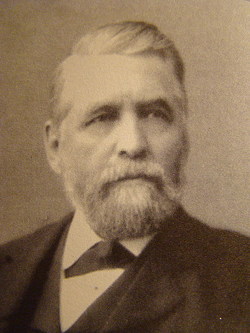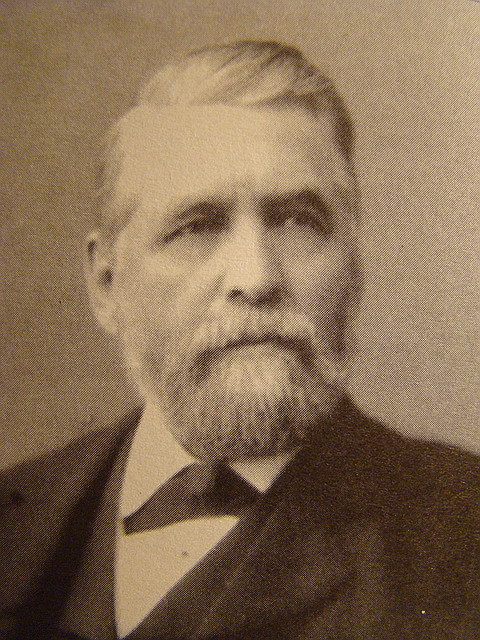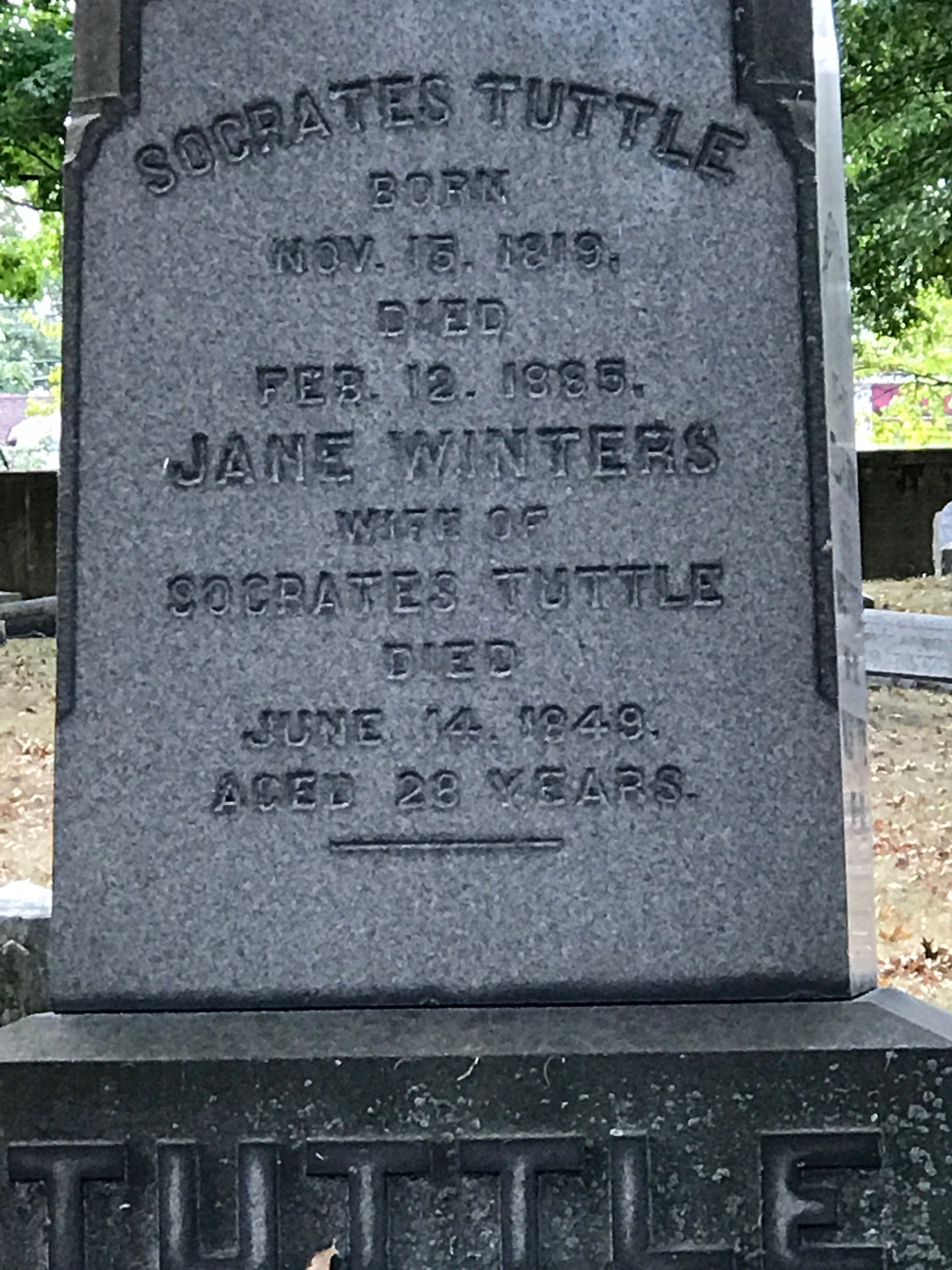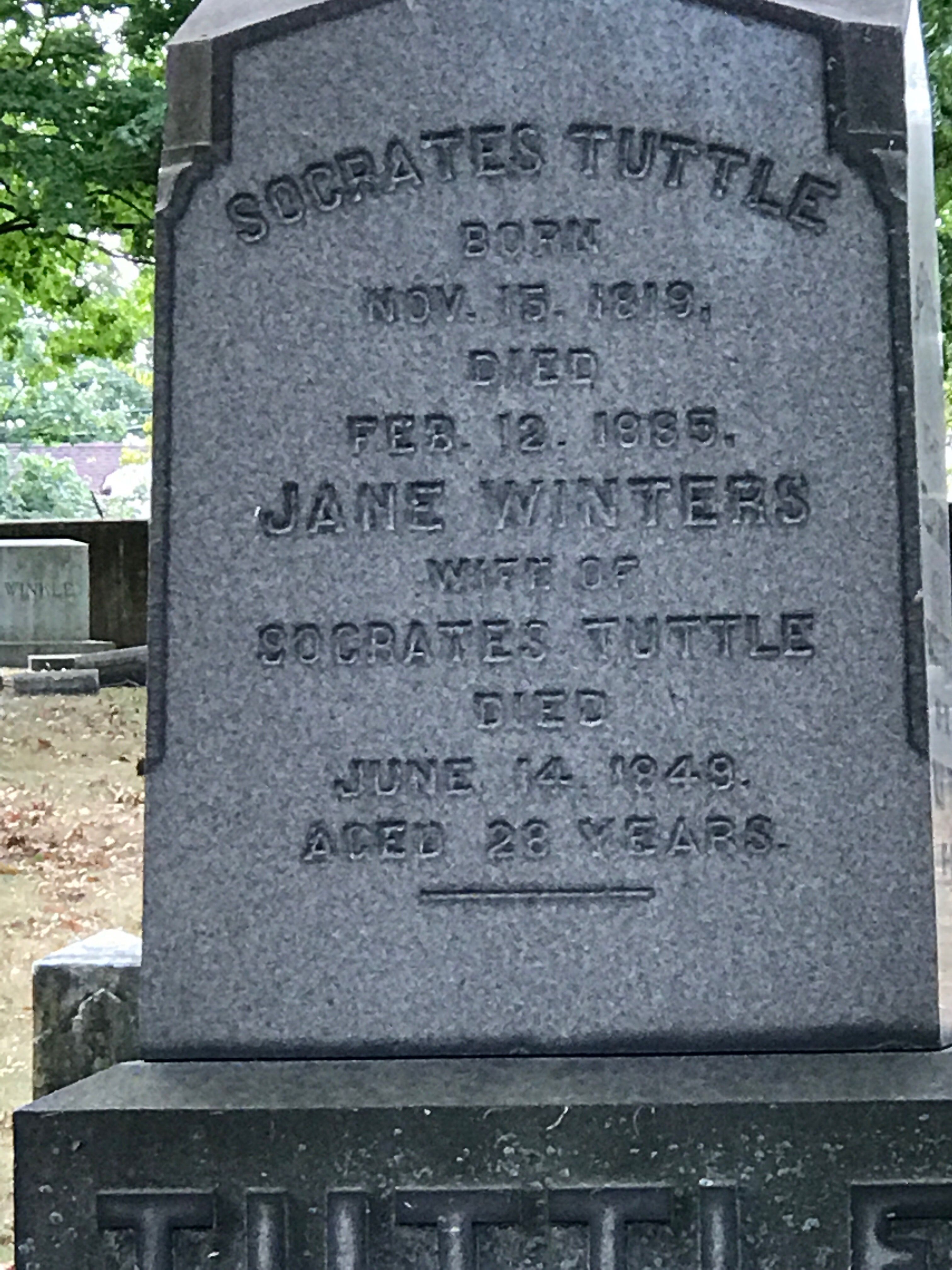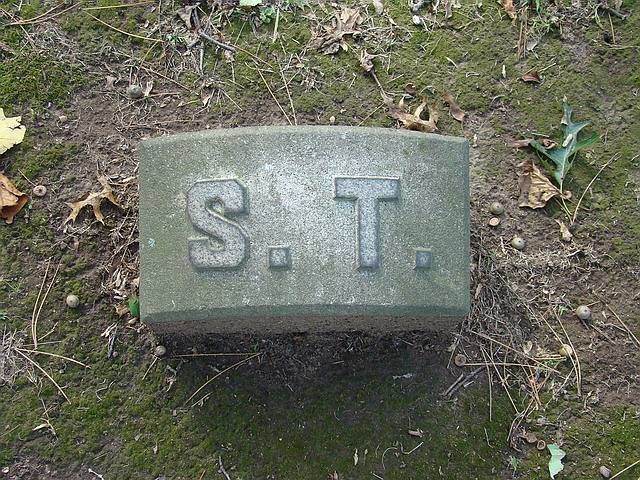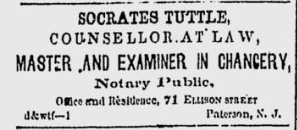Horatio Tuttle learned the trade of a blacksmith at Bath, N.H., in early life, and afterwards worked at that place for a short time. He subsequently removed to Coos County, in the same State, where he worked steadily at his trade until his death on Dec. 31, 1842. His wife was Betsey Thomas, a native of Acton, Mass., who bore him a family of nine children, all of whom attained to years of maturity. She died Oct. 1, 1842. Jonathan Tuttle, born April 6, 1814, grew up at Colebrook, N.H., learned the trade of a blacksmith, and died in August, 1843. John Leighton, born Sept. 22, 1815, left his home in boyhood, learned the trade of a woolen-spinner, and afterwards removed to Paterson, N.J., where he labored as a machinist for several years. He died in Philadelphia in 1863. Charles Martin, born Feb. 18, 1818, was educated at Barnet, Vt., studied medicine with his uncle, Socrates, and has practiced his profession at Littleton, N.H., since 1839. Elizabeth, born May 9, 1822, married E.
A. Harwood, of Worcester, Mass., and resides there. William A., born May 8, 1824, learned the trade of a machinist, and resided at Paterson, N.J., until his death in January, 1869. Horatio Gates and Catharine Gray Tuttle were born April 22, 1827. The first was in the service of the government as a carpenter during the late war, and was last heard of at Chattanooga, Tenn., in 1865; the second passed her life as a teacher in Bergen County and Paterson, N.J., married a Mr. Nelson, and died in April, 1877. Mary, born Aug. 23, 1830, married John Sargent, of Littleton, N.H., where she and her husband both died in the spring of 1881.
Socrates Tuttle, the fourth of the children of Horatio Tuttle, was early inured to a life of labor and toil. His parents were very poor, and his boyhood days were attended by many privations. His book education was received at the common schools of New Hampshire, which he attended three months of each year until he reached the age of twenty-one. The remainder of the time was passed in his father’s blacksmith-shop, with the exception of a few short intervals of time, during which he worked at other pursuits, such as brick-making, team-driving, and farming, in the employment of others. He became an expert blacksmith, and worked hard at that trade until he was twenty-two years of age. Having then formed a distaste for the business, and feeling that he was fitted for a higher, though not more honorable, vocation in life, he left home with a Yankee boy’s usual capital,— a jack-knife, a few dollars, and a brave and hopeful heart,— and located at Blue Ball, Monmouth Co., N.J., where he taught a subscription pay-school from December, 1841, until March, 1844. At that time he removed to Paterson, N.J., and entered upon the study of the law in the office of James Speer, of that city, with whom he remained until the latter’s appointment as one of the judges of the Court of Errors and Appeals of New Jersey, about a year later. Mr. Tuttle then entered the office of Benjamin W. Vandervoort, of Paterson, where he remained until his admission to the bar as an attorney-at-law and solicitor in chancery, in April, 1848. He at once entered upon the practice of his profession, and has continued in it to the present time. He was licensed as a counselor at law in 1851.
When Mr. Tuttle first commenced the practice of law in Paterson, the field was well occupied for that early day, and he had to contend with such men as Judge Elias B.D. Ogden, Daniel Barkalow, Aaron S. Pennington, Benjamin W. Vandervoort, Silas D. Canfield, John M. Gould, John Hopper, and Absalom B. Woodruff. The earnings of the first year were only four hundred dollars, but during that time he had manifested a peculiar talent for the law, had familiarized himself with the practice of the courts, and had drawn attention to himself as a hard-working, faithful, and promising member of the bar. His business gradually increased from that time, until he found himself enjoying one of the largest and most lucrative practices in the city. At first it consisted largely of a collection and commercial litigation business, but general litigation came in upon him so rapidly that he was obliged to hand over the greater part of the former to his son-in-law, Hon. G.A. Hobart, and to devote himself to active practice in the courts. He has been engaged in a large number of important civil cases, and in the defense of criminals has achieved marked success. He brings to the management of his causes a degree of force which few can command, and handles the facts of a case with peculiar skill and tact. He acted as the counsel of the Delaware, Lackawanna and Western Railroad Company in acquiring title to land for the Boonton Branch of that road, and also for the Midland Railroad of New Jersey in the same direction. He was also counsel for the defendant in the celebrated chancery cause of Sigismund Dringer, at the suit of the New York, Lake Erie and Western Railway Company, which has become familiar of late years, and from which he voluntarily withdrew in 1881 for good cause, and after having successfully sustained his ease in the Court of Chancery. He also defended, by the appointment of the court, John Jonston, who was indicted for the murder of John S. Van Winkle and wife on Jan. 9, 1850, and who was the only person ever hung in Passaic County. The proofs against Jonston were overwhelming. Mr. Tuttle was also the counsel of William Dalzell, who was indicted for murder committed during the Garret Mountain riot in 1880, but who was acquitted; also of Koma Nymnen, charged with the murder of his father, in Acquackanonk township, during the same year, and who was also acquitted. He had as a partner from 1873 to 1880 Hon. John W. Griggs, at present city counsel of Paterson.
Mr. Tuttle has always taken an active interest in politics, being at first a member of the old Whig party, and afterwards an ardent Republican. He has held a number of important public offices, was clerk of the city of Paterson in 1851 and 1852, member of the board of chosen freeholders from the same city, and in 1861 and 1862 represented the Second District of Passaic County in the State Legislature. The labors of this Legislature were necessarily heavy at that trying period, and he filled an important place in its deliberations, and was a member of the judiciary and other important committees. In 1871 and 1872 he was mayor of the city of Paterson. He is a member and one of the trustees of the First Presbyterian Church of that city, a member of the board of managers of the Old Ladies’ Home, and lends his support to every good work. He is literally one of the self-made men of the city, and has raised himself from the anvil to his present prominent position by sheer force of character and brain. He possesses marked individuality of character, and is decidedly original in his methods of thought and action.
He married on May 23, 1848, Jane, daughter of Baltus and Esther Winters, of Paterson, who died June 14, 1849, leaving an only daughter, Jane, wife of Hon. G.A. Hobart, of Paterson. His second wife was Mary, eldest daughter of William Dickey, Esq., of Paterson, whom he married in November, 1852, and who died Aug. 25, 1869. The children were Charles M., a practicing lawyer of the city of Paterson; William D., a clerk in the office of the New York, Susquehanna and Western Railway Company at New York; Minnie, who died in infancy; Elizabeth Murray, who died at the age of three years; Lilian, who died at seven; and Augustus Hobart, born Aug. 25, 1869. Mr. Tuttle’s present wife is Elizabeth A., widow of Dr. F.S. Weller, a surgeon in the United States army, who was drowned off Cape Hatteras in February, 1862, and who was a leading physician in Paterson for a number of years.
Horatio Tuttle learned the trade of a blacksmith at Bath, N.H., in early life, and afterwards worked at that place for a short time. He subsequently removed to Coos County, in the same State, where he worked steadily at his trade until his death on Dec. 31, 1842. His wife was Betsey Thomas, a native of Acton, Mass., who bore him a family of nine children, all of whom attained to years of maturity. She died Oct. 1, 1842. Jonathan Tuttle, born April 6, 1814, grew up at Colebrook, N.H., learned the trade of a blacksmith, and died in August, 1843. John Leighton, born Sept. 22, 1815, left his home in boyhood, learned the trade of a woolen-spinner, and afterwards removed to Paterson, N.J., where he labored as a machinist for several years. He died in Philadelphia in 1863. Charles Martin, born Feb. 18, 1818, was educated at Barnet, Vt., studied medicine with his uncle, Socrates, and has practiced his profession at Littleton, N.H., since 1839. Elizabeth, born May 9, 1822, married E.
A. Harwood, of Worcester, Mass., and resides there. William A., born May 8, 1824, learned the trade of a machinist, and resided at Paterson, N.J., until his death in January, 1869. Horatio Gates and Catharine Gray Tuttle were born April 22, 1827. The first was in the service of the government as a carpenter during the late war, and was last heard of at Chattanooga, Tenn., in 1865; the second passed her life as a teacher in Bergen County and Paterson, N.J., married a Mr. Nelson, and died in April, 1877. Mary, born Aug. 23, 1830, married John Sargent, of Littleton, N.H., where she and her husband both died in the spring of 1881.
Socrates Tuttle, the fourth of the children of Horatio Tuttle, was early inured to a life of labor and toil. His parents were very poor, and his boyhood days were attended by many privations. His book education was received at the common schools of New Hampshire, which he attended three months of each year until he reached the age of twenty-one. The remainder of the time was passed in his father’s blacksmith-shop, with the exception of a few short intervals of time, during which he worked at other pursuits, such as brick-making, team-driving, and farming, in the employment of others. He became an expert blacksmith, and worked hard at that trade until he was twenty-two years of age. Having then formed a distaste for the business, and feeling that he was fitted for a higher, though not more honorable, vocation in life, he left home with a Yankee boy’s usual capital,— a jack-knife, a few dollars, and a brave and hopeful heart,— and located at Blue Ball, Monmouth Co., N.J., where he taught a subscription pay-school from December, 1841, until March, 1844. At that time he removed to Paterson, N.J., and entered upon the study of the law in the office of James Speer, of that city, with whom he remained until the latter’s appointment as one of the judges of the Court of Errors and Appeals of New Jersey, about a year later. Mr. Tuttle then entered the office of Benjamin W. Vandervoort, of Paterson, where he remained until his admission to the bar as an attorney-at-law and solicitor in chancery, in April, 1848. He at once entered upon the practice of his profession, and has continued in it to the present time. He was licensed as a counselor at law in 1851.
When Mr. Tuttle first commenced the practice of law in Paterson, the field was well occupied for that early day, and he had to contend with such men as Judge Elias B.D. Ogden, Daniel Barkalow, Aaron S. Pennington, Benjamin W. Vandervoort, Silas D. Canfield, John M. Gould, John Hopper, and Absalom B. Woodruff. The earnings of the first year were only four hundred dollars, but during that time he had manifested a peculiar talent for the law, had familiarized himself with the practice of the courts, and had drawn attention to himself as a hard-working, faithful, and promising member of the bar. His business gradually increased from that time, until he found himself enjoying one of the largest and most lucrative practices in the city. At first it consisted largely of a collection and commercial litigation business, but general litigation came in upon him so rapidly that he was obliged to hand over the greater part of the former to his son-in-law, Hon. G.A. Hobart, and to devote himself to active practice in the courts. He has been engaged in a large number of important civil cases, and in the defense of criminals has achieved marked success. He brings to the management of his causes a degree of force which few can command, and handles the facts of a case with peculiar skill and tact. He acted as the counsel of the Delaware, Lackawanna and Western Railroad Company in acquiring title to land for the Boonton Branch of that road, and also for the Midland Railroad of New Jersey in the same direction. He was also counsel for the defendant in the celebrated chancery cause of Sigismund Dringer, at the suit of the New York, Lake Erie and Western Railway Company, which has become familiar of late years, and from which he voluntarily withdrew in 1881 for good cause, and after having successfully sustained his ease in the Court of Chancery. He also defended, by the appointment of the court, John Jonston, who was indicted for the murder of John S. Van Winkle and wife on Jan. 9, 1850, and who was the only person ever hung in Passaic County. The proofs against Jonston were overwhelming. Mr. Tuttle was also the counsel of William Dalzell, who was indicted for murder committed during the Garret Mountain riot in 1880, but who was acquitted; also of Koma Nymnen, charged with the murder of his father, in Acquackanonk township, during the same year, and who was also acquitted. He had as a partner from 1873 to 1880 Hon. John W. Griggs, at present city counsel of Paterson.
Mr. Tuttle has always taken an active interest in politics, being at first a member of the old Whig party, and afterwards an ardent Republican. He has held a number of important public offices, was clerk of the city of Paterson in 1851 and 1852, member of the board of chosen freeholders from the same city, and in 1861 and 1862 represented the Second District of Passaic County in the State Legislature. The labors of this Legislature were necessarily heavy at that trying period, and he filled an important place in its deliberations, and was a member of the judiciary and other important committees. In 1871 and 1872 he was mayor of the city of Paterson. He is a member and one of the trustees of the First Presbyterian Church of that city, a member of the board of managers of the Old Ladies’ Home, and lends his support to every good work. He is literally one of the self-made men of the city, and has raised himself from the anvil to his present prominent position by sheer force of character and brain. He possesses marked individuality of character, and is decidedly original in his methods of thought and action.
He married on May 23, 1848, Jane, daughter of Baltus and Esther Winters, of Paterson, who died June 14, 1849, leaving an only daughter, Jane, wife of Hon. G.A. Hobart, of Paterson. His second wife was Mary, eldest daughter of William Dickey, Esq., of Paterson, whom he married in November, 1852, and who died Aug. 25, 1869. The children were Charles M., a practicing lawyer of the city of Paterson; William D., a clerk in the office of the New York, Susquehanna and Western Railway Company at New York; Minnie, who died in infancy; Elizabeth Murray, who died at the age of three years; Lilian, who died at seven; and Augustus Hobart, born Aug. 25, 1869. Mr. Tuttle’s present wife is Elizabeth A., widow of Dr. F.S. Weller, a surgeon in the United States army, who was drowned off Cape Hatteras in February, 1862, and who was a leading physician in Paterson for a number of years.
Family Members
Advertisement
Explore more
Sponsored by Ancestry
Advertisement
